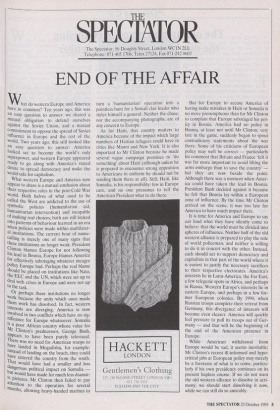SPECTATOR
The Spectator, 56 Doughty Street, London WC1N 2LL Telephone: 071-405 1706; Telex 27124; Fax 071-242 0603
END OF THE AFFAIR
hat do western Europe and America have in common? Ten years ago, this was an easy question to answer: we shared a mutual obligation to defend ourselves against the Soviet Union, and a mutual Commitment to oppose the spread of Soviet Influence in Europe and the rest of the world. Two years ago, this still looked like an easy question to answer: America looked set to become the world's only superpower, and western Europe appeared ready to go along with America's stated desire to spread democracy and make the world safe for capitalism.
What western Europe and America now appear to share is a mutual confusion about their respective roles in the post-Cold War world. Both halves of what used to be called the West are addicted to the use of symbolic policies (humanitarian aid, humanitarian intervention) and incapable of making real choices; both are still locked into patterns of behaviour learned in an era when policies were made within multilater- al institutions. The current bout of name- calling is merely one of many signs that these institutions no longer work: President Clinton blames Europe for not following his lead in Bosnia, Europe blames America for effectively sabotaging whatever meagre policy Europe had. Perhaps the real blame should be placed on institutions like Nato, the EEC and the UN, which were set up to deal with crises in Europe and were not up to the task.
Or perhaps these institutions no longer work because the unity which once made them work has dissolved. In fact, western interests are diverging. America is now involved in two conflicts which have no sig- nificance for Europe whatsoever. Somalia is a poor African country whose value for Mr Clinton's predecessor, George Bush, appears to have been purely televisual. There was no need for American troops to have landed in Mogadishu, for example: instead of landing on the beach, they could have entered the country from the south. That would have had a smaller and less dangerous political impact on Somalia hut would have made for much less dramat- ic pictures. Mr Clinton then failed to pay attention to the operation for several months, allowing heavy-handed marines to turn a 'humanitarian' operation into a pointless hunt for a Somali clan leader who styles himself a general. Neither the chase, nor the accompanying photographs, are of any concern to Europe. As for Haiti, that country matters to America because of the impact which large numbers of Haitian refugees could have in cities like Miami and New York. It is also important to Mr Clinton because he made several vague campaign promises to 'do something' about Haiti (although unless he is prepared to encounter strong opposition to Americans in uniform he should not be sending them there at all). Still, Haiti, like Somalia, is his responsibility: few in Europe care, and no one presumes to tell the American President what to do there. But for Europe to accuse America of having make mistakes in Haiti or Somalia is no more presumptuous than for Mr Clinton to complain that Europe sabotaged his pol- icy in Bosnia. America had no policy in Bosnia, at least not until Mr Clinton, very late in the game, suddenly began to spout contradictory statements about the war there. Some of his criticisms of European policy may well be correct — particularly his comment that Britain and France 'felt it was far more important to avoid lifting the arms embargo than to save the country' but they are now beside the point. Although there was a moment when Amer- ica could have taken the lead in Bosnia, President Bush decided against it because he felt that Bosnia lay within a European zone of influence. By the time Mr Clinton arrived on the scene, it was too late for America to have much impact there.
It is time for America and Europe to say out loud what they have silently come to believe: that the world must be divided into spheres of influence. Neither half of the old western alliance is prepared to play the role of world policeman, and neither is willing to do it in concert with the other. Instead, each should act to support democracy and capitalism in that part of the world where it is easiest to justify the necessary sacrifices to their respective electorates. America's interests lie in Latin-America, the Far East, a few telegenic spots in Africa, and perhaps in Russia. Western Europe's interests lie in eastern Europe, and perhaps in a few for- mer European colonies. By 1994, when Russian troops complete their retreat from Germany, this divergence of interests will become even clearer. America will quickly feel pressure to pull its troops out of Ger- many — and that will be the beginning of the end of the American presence in Europe.
While American withdrawal from Europe would be sad, it seems inevitable; Mr Clinton's recent ill-informed and hypo- critical jabs at European policy may merely be a foretaste of what is to come, particu- larly if his own presidency continues on its present hapless course. If we do not want the old western alliance to dissolve in acri- mony, we should start dissolving it now, while we can still do so amicably.


































































 Previous page
Previous page